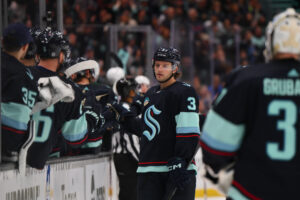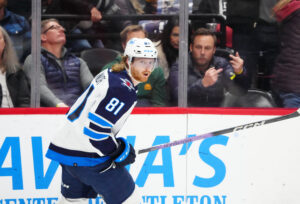Welcome to Last Word on Hockey’s One-Hit Wonder series. Each day, we will take a look at a new team’s three biggest one-hit wonders. These are players that had one great season or playoff run but never did anything like that again. Join us every day for a new team! Today we take a look at the Calgary Flames One-Hit Wonders.
The Calgary Flames Top Three One-Hit Wonders
Jiri Hudler
Jiri Hudler was a skilled winger who usually scored around 50 points a season. He had a good shot, excellent hands and good playmaking ability. Hudler played five seasons with the Detroit Red Wings from 2006-2012 and was a key player in their 2008 Stanley Cup run, scoring 14 points in 22 games. He was a good top-six forward, not a star, but someone a team could count on for consistent scoring.
In the summer of 2012, he signed a four year $16 million contract with the Calgary Flames as a free agent. He lived up to expectations in Calgary during his first two seasons. He scored 27 points in 42 games during the lockout-shortened 2012-13 season. The following year he scored 54 points. Everything pointed to him having a similar 50-point season during 2014-15. However, Hudler blew away expectations.
One-Hit Season
Hudler became one of the Calgary Flames one-hit wonders during the 2014-15 season. He scored career highs in goals (31), assists (45) and points (76) to lead the Flames in scoring by 12 points. Hudler’s 76 points were 19 more than his previous career-high of 57. It also placed him eighth in league scoring. His performance, along with the performance of young linemates Johnny Gaudreau and Sean Monahan, propelled the Flames to surprisingly make the playoffs after missing it for five seasons.
Hudler won the Lady Byng Trophy that season as the league’s most sportsmanlike player. He also finished 13th in Hart Trophy voting as the most valuable player to his team. Hudler was second among Calgary forwards in ice-time (18:07) second in game-winning goals (5) second in even-strength Corsi For percentage among players to have played over 20 games (48.2 percent). He also had 48 takeaways and 32 giveaways, so he was responsible with the puck.
Opportunity and skilled linemates was the reason for his success. He had been a top player on the Flames during the 2013-14 season, leading the team in scoring with 54 points. However, Mike Cammalleri was the only other Flames’ forward to score over 40 points that year, so Hudler didn’t have a lot to work with.
In the 2014-15 season, Gaudreau scored 64 points to be a Calder Trophy finalist, and Monahan jumped 28 points from his rookie season to score 62 points. The combination of opportunity and more skilled linemates allowed Hudler to soar. He was seen as a big reason for the quick development of Gaudreau and Monahan.
After the Wonder
Hudler fell back to earth with the Flames the following year. He scored 35 points in 53 games, which would have put him at 54 points if he played a full season with Calgary. That is his usual average. The drop-off combined with him being a free agent at the end of the season meant that the Flames traded him to the Florida Panthers around the trade deadline. Hudler played well in Florida, scoring 11 points in 19 games.
After the season, he signed a one-year $2 million deal with the Dallas Stars. Unfortunately for him, his struggles continued. He played just 32 games and scored 11 points. He had a publicly unknown illness that kept him out of the lineup. Hudler also was never able to find his role with the Stars, consistently moving around the lineup.
During the off-season, he was not re-signed and never played in another NHL game. He allegedly had a strange encounter on a flight from New York to Prague. According to reports, Hudler asked a flight attendant for cocaine, and when the attendant refused, Hudler threatened to have them killed. He was also accused of using cocaine in the bathroom and urinating on a food cart. Hudler denied the allegations.
Shean Donovan
The second of the Calgary Flames one-hit wonders is Shean Donovan. Donovan played nine seasons in the NHL and was known as a fast and physical bottom-six player with excellent size (6′-3″ 210 pounds). Offensively, he was a secondary scorer, usually scoring around 10-20 points a season.
The Flames traded for him in March of 2003 from the Pittsburgh Penguins. He scored 3 points in 13 games that season with the Flames. He was not showing any indication that he could be one of their top scores the following season.
One-Hit Season
The 2003-04 season was Donovan’s tenth in the league. Amazingly, he played his first full 82-game season and was rewarded for it. He hit career highs in goals (18) assists (24) points (42) average ice-time (14:55) power-play points (5) shooting percentage (13), and at the time, he set a career-high in penalty minutes (72).
He was one of Calgary’s most important players. Donovan had the second-most goals on the Flames, third-most assists and points and was second in game-winning goals with eight. He was also solid defensively, earning the only Selke Trophy vote of his career as the league’s best defensive forward.
Donovan continued his strong play in the postseason. The Flames made it to Game 7 of the Stanley Cup playoffs against the Tampa Bay Lightning, losing by a heartbreaking 2-1 score. In 24 playoff games, Donovan played 15:27 minutes per game and scored 10 points.
After the Wonder
The full-year 2004-05 lockout took place after the following year. Donovan played 12 games in Switzerland, scoring 12 points. The NHL was back for the 2005-06 season, and Donovan played well. He fired 132 shots on goal, which was six back of his career-high he set the previous season.
However, the pucks weren’t going in for him. His shooting percentage dropped from 13 to 6.8, and Donovan only scored nine goals and 20 points. His ice-time dropped to 11:47 after the Flames acquired wingers such as Tony Amonte and Chuck Kobasew.
Donovan left the Flames as a free agent and signed with the Boston Bruins. His role improved as he played 14 minutes a game, but his scoring didn’t reach the same heights as when he scored 20 points. Boston traded him in the off-season to the Ottawa Senators, where he played junior hockey. Donovan was a Senator for three seasons playing as a bottom-six player and scored 27 points in 177 games. He retired in 2010 and is currently a player development coach with the Senators.
Jiri Hrdina
Jiri Hrdina is the third of the Calgary Flames one-hit wonders. Calgary drafted Hrdina 159th overall in the 1984 NHL draft as a 26-year-old. Hrdina scored nine points in seven games in the 1984 Olympics, helping Czechoslovakia win the silver medal. That certainly helped his visibility among NHL teams.
He played four more seasons in Czechoslovakia and joined the Flames after the 1988 Olympics. As a 30-year-old rookie, he scored seven points in nine games. He showed that he had some offensive promise in the NHL.
One-Hit Season
Hrdina lived up to the expectations he set for himself during his brief appearance with the Flames the previous season and scored 22 goals and 54 points in 70 games. He finished ninth in Calder Trophy voting. His most impressive game was against the Hartford Whalers, where he scored four goals in a 6-4 win. However, he was only able to play four games in the playoffs, but that didn’t slow down the Flames. They went on to win the organization’s only Stanley Cup.
After the Wonder
It wasn’t surprising that Hrdina had an offensive drop off in his second season. The season prior, he had a shooting percentage of 15, and it did drop to 12.5. However, Hrdina only scored 12 goals and 30 points that year, which was a significant drop-off. Average ice-time wasn’t recorded back then, but Hrdina’s shot total went from 147 to 96, signalling that there might have been less opportunity.
The next season, 1990-91, Hrdina started slow. He scored three assists in 14 games, and Calgary traded him to the Pittsburgh Penguins to mentor countrymen and rookie Jaromir Jagr. Jagr had limited English skills and was having a tough time communicating and feeling comfortable in North America.
Hrdina’s presence allowed Jagr to get more comfortable. Hrdina played as a third or fourth-line centre with the Penguins but found his scoring touch again scoring 20 points in 37 games. He played 14 games in the playoffs and scored four points. He won his second Stanley Cup that season.
The following season Hrdina scored 16 points in 56 games for the Penguins. In the playoffs, he scored two assists in 21 playoff games and won his third Stanley Cup in four years. The 34-year-old retired after that season. He is now an amateur scout with the Dallas Stars.
Main Photo:






